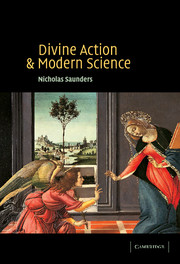Book contents
- Frontmatter
- Contents
- Preface
- Chapter 1 Motivations
- Chapter 2 Theological approaches to divine action
- Chapter 3 The laws of nature and miracles
- Chapter 4 Determinism and SDA
- Chapter 5 Divine action and quantum theory
- Chapter 6 Does God cheat at dice?
- Chapter 7 Chaos Theory and divine action
- Chapter 8 Whole–part models of SDA
- Chapter 9 Is SDA really tenable?
- References
- Index
Chapter 5 - Divine action and quantum theory
Published online by Cambridge University Press: 02 December 2009
- Frontmatter
- Contents
- Preface
- Chapter 1 Motivations
- Chapter 2 Theological approaches to divine action
- Chapter 3 The laws of nature and miracles
- Chapter 4 Determinism and SDA
- Chapter 5 Divine action and quantum theory
- Chapter 6 Does God cheat at dice?
- Chapter 7 Chaos Theory and divine action
- Chapter 8 Whole–part models of SDA
- Chapter 9 Is SDA really tenable?
- References
- Index
Summary
Up to this point we have been dealing almost exclusively with the theoretical concepts of indeterminism, the laws of nature and various theological approaches to SDA. The next three chapters of this book consider in detail the two areas of modern science that are most commonly claimed to be consonant with SDA, namely quantum theory and chaos theory. In the discussion that follows it is presumed that the reader is reasonably conversant with the historical background to the discovery of both theories and the principal philosophical consequences of the different interpretations of quantum theory.
It may seem from a cursory reading of current scholarship on the potential relationship between SDA and quantum theory that the proposition that God determines quantum processes is relatively recent. It is clear, however, that this assertion has been a consistent element of the philosophical wrangling over the interpretation of quantum theory for at least the past sixty years. Indeed, while William Pollard's famous work Chance and Providence set the agenda for contemporary debates (Pollard 1958), it is erroneous to view this work as the sole origin of the proposal that God is active in quantum events. As we shall see, it is clear that Pollard was himself influenced by Karl Heim and adopted a very similar notion of God's interaction with quantum theory to that proposed by Heim.
Information
- Type
- Chapter
- Information
- Divine Action and Modern Science , pp. 94 - 126Publisher: Cambridge University PressPrint publication year: 2002
